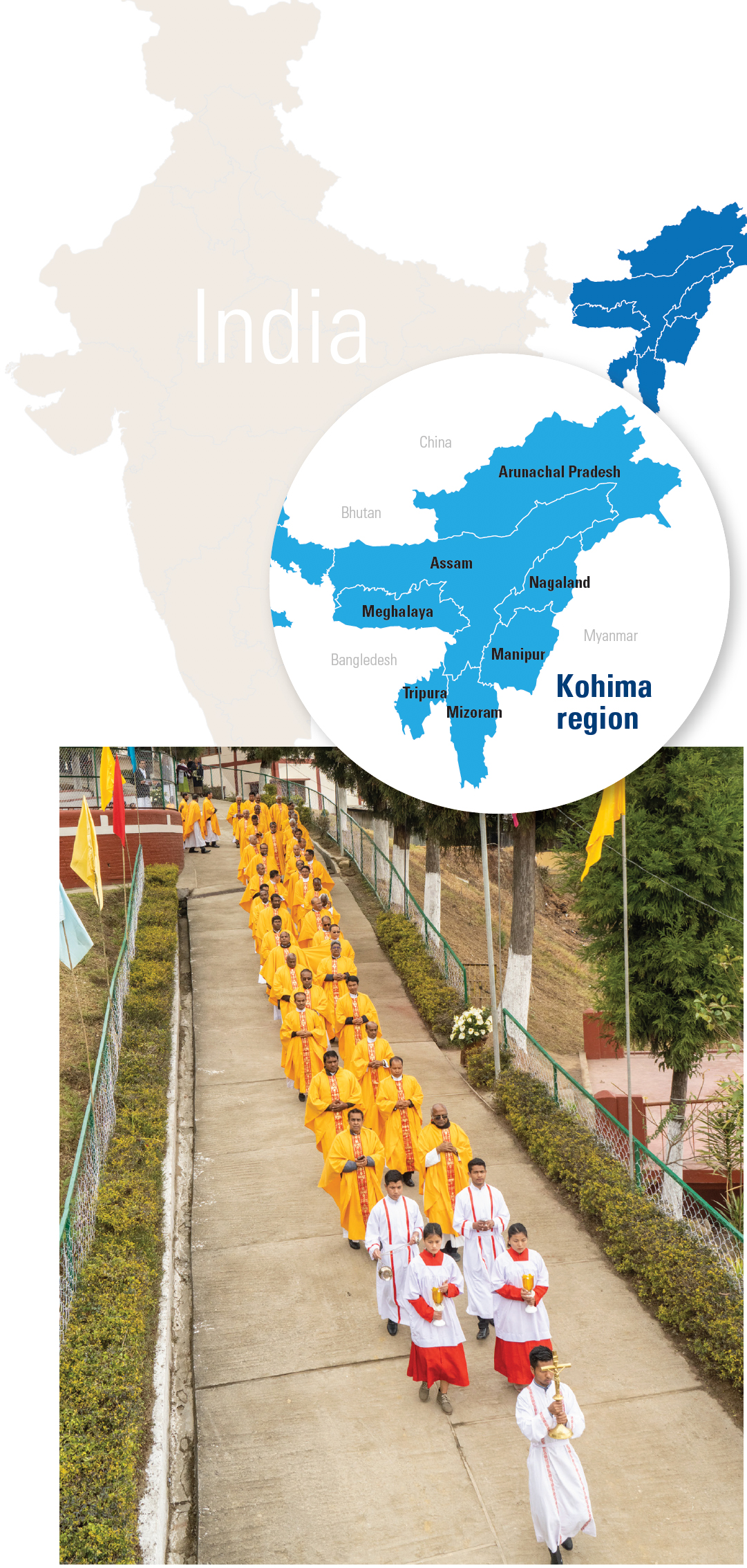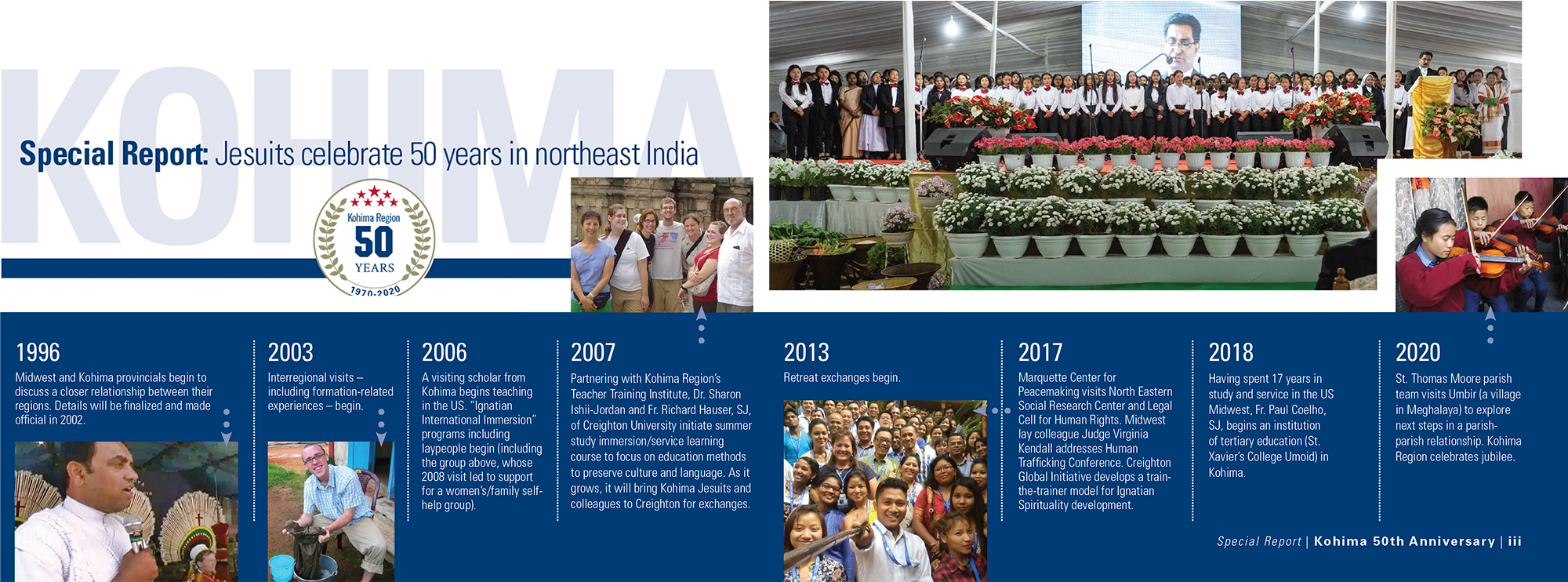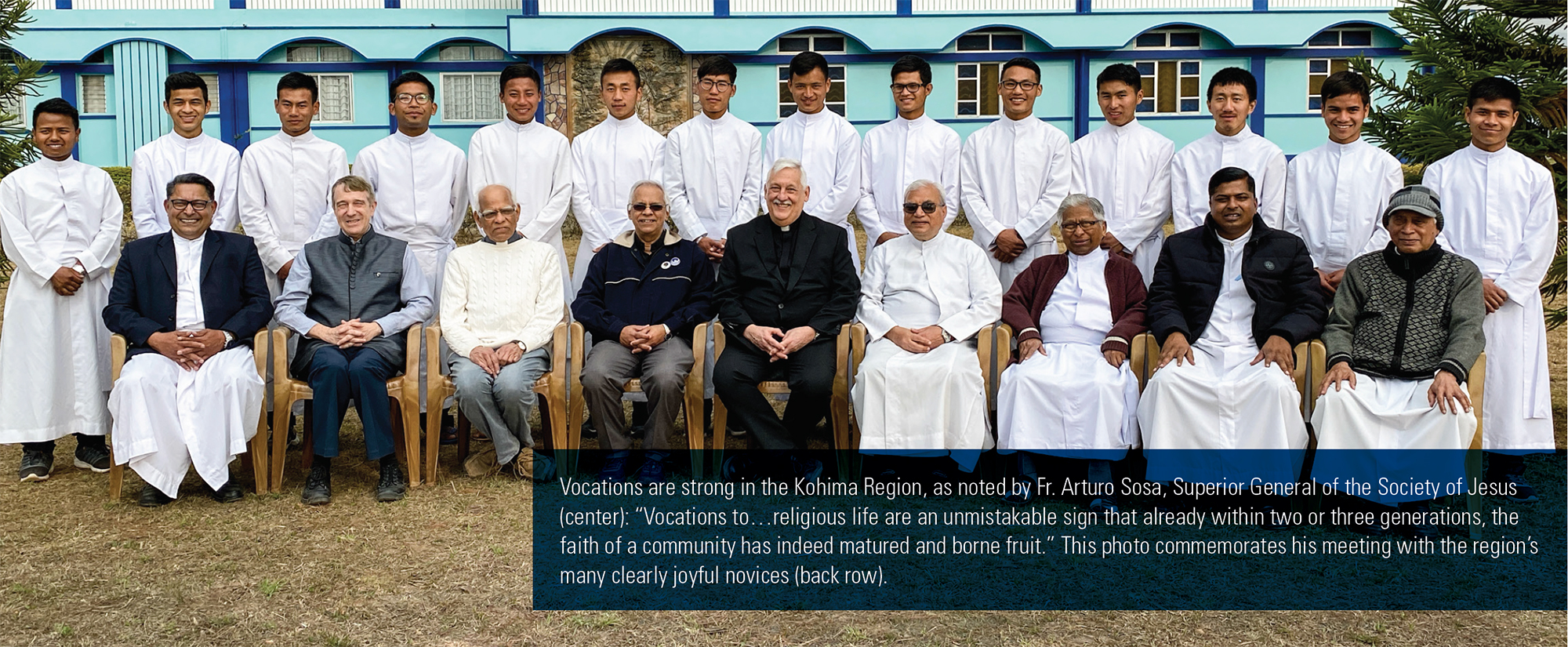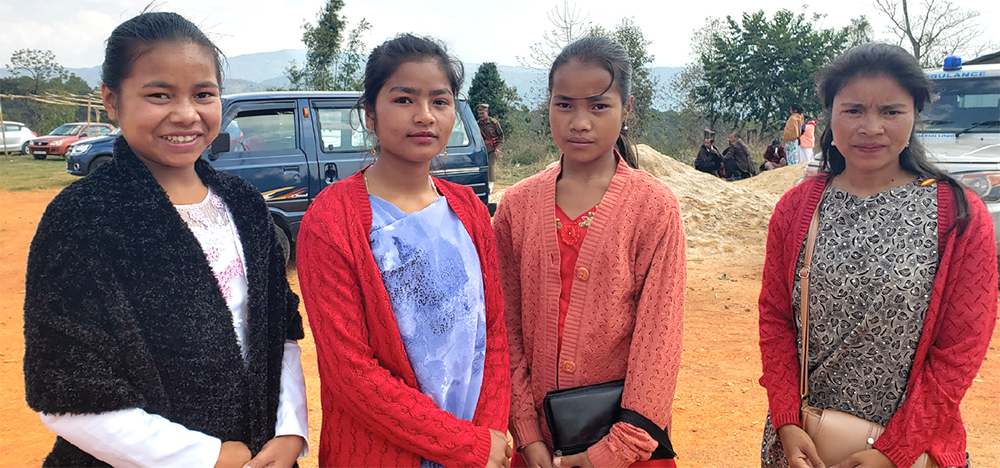
This article was written with support from Jesuits in the Kohima Region. Special thanks to Fr. Don Doll, SJ, who provided most of the photos. If you'd like to download this special report as a pdf, please click here.
In 1970, IBM introduced the floppy disk. The age of disco dawned. And the provincial of Karnataka, India, sent three Jesuits to start a mission in his country’s northeast region.
While the initial plan was to educate the children of prominent families, the Jesuits took a different path, establishing a school in an undeveloped indigenous village called Jakhama, in the state of Nagaland. With the collaboration of religious sisters, they overcame setbacks and the school thrived. Leaders from neighboring villages were soon requesting similar schools, as transportation options were poor and commuting to Jakhama was not viable for them.
Gradually, a second school started and, in 10 years, the Jesuits had schools in almost every village in the region. They also became engaged in ministries like social action; options for the poor; religious and cultural dialogue; care for our common home; and human development, social research, and communication initiatives.
In 2020, that original outreach mission – having become the Kohima Region of the Society of Jesus within 25 years – is celebrating its golden jubilee. In March, Fr. Arturo Sosa, Superior General of the Society of Jesus, traveled to Kohima to participate. Escorted by four Naga warriors, he was solemnly adorned with traditional Naga attire, then 100 Naga men in cultural dress led him in procession to the celebration venue, where he unveiled the jubilee monolith (which stands with another from the mission’s start and a second from its 25th anniversary).
The Eucharistic celebration then began with a procession led by 25 couples from 25 ethnic groups with whom the Jesuits work. Presided over by Fr. Sosa, the Mass was concelebrated by the bishop of Kohima, Fr. Melvil Pereira, SJ (Kohima regional superior), ten other bishops, representatives from women’s religious orders who collaborate with the Jesuits, and nearly 150 priests. Over 2,500 people attended.
In his homily, Fr. Sosa recounted God’s ways of working through the Kohima Jesuits: “We celebrate the hallowed memory of the [pioneers].…Today their successors continue to live and enrich the precious legacy, which those pioneers bequeathed to them.”


He also noted how Kohima Jesuits have kept moving in true Ignatian tradition, “responding to the call of people and places where they discerned a greater need. They handed over to the dioceses those parish centers and institutions that had already been sufficiently well established, to be free to move on to new apostolic frontiers…”
For the offertory, 50 women came in procession with 50 baskets of produce from their land, and the thanksgiving Eucharist concluded with the Papal Blessing to the Kohima Region for the occasion.
Two days later, a celebration was held in Umbir, in the state of Meghalaya. Following the tradition of the Khasi people there, young Jesuits carried saplings for planting to create a sacred grove, as if to say, “we will continue the legacy initiated by those who came before us.”
When asked what he liked most about his visit, Fr. Sosa said it was the involvement of the people – that this was a celebration not just of the Jesuits, but of those who had collaborated with them.
Sharing gifts and resources
On hand to help celebrate the Kohima Jesuits’ jubilee were several representatives from the Midwest province – as the two regions have had a special relationship called a convenio since 2002.
Most simply put, the convenio is a pledge signed by the two provinces to support each other in their shared mission to serve faith, promote justice, and engage in dialogue with other cultures through friendship and understanding.
Gifts and resources to be shared in this mutually beneficial partnership are: culture, communication and friendship, theological and apostolic reflection, reflections on Jesuit life, cooperation and support in ministry, Ignatian Spirituality, knowledge resources, cooperation in formation and ongoing formation, advocacy, and emergency assistance.

There are many graces in the relationship, writes Kohima Jesuit Fr. Philip Abraham, SJ. These include “the strengthening of one’s vocation, discovering a new dimension of one’s religious calling, new insights and widening of perspectives, world-class education at the highest levels, and a deep appreciation and experience of how the Society of Jesus seeks, finds, and does God’s will in different parts of the world.”
Midwest Jesuits Fr. Provincial Brian Paulson, SJ, adds, “Our mutual work with indigenous communities and marginalized ethnic groups motivated Fr. Peter Hans Kolvenbach, then Superior General of the Society of Jesus, to ask our provinces to work closely together. We agreed from the start that this agreement must be more than a transactional agreement of personnel or resources; rather it must be inspired by Ignatian Spirituality and evaluated honestly in the spirit of the Examen. As a result, each province has been blessed by Jesuits made available by the other to our ministries, communities, and Jesuit formation – enriching our respective institutions, communities, and local ministries in the process.”
All involved agree that the mutual experiences have provided a deeper awareness of the Society’s universal mission.


Post-event reality: COVID-19
As participants celebrated Kohima’s golden jubilee, an invisible enemy lay in wait. Father Anand Pereira, SJ, Kohima regional development director, recalls, “We just completed the jubilee celebration and bang came the lockdown. The worst hit in this pandemic are the poor migrants who have come to the cities to work and are unable to get back their homes.” To address the need of displaced workers, Kohima Jesuits have been cooking (with just one small house of six reporting they are feeding 250 per day — and they are only one of many!), distributing them on the streets, and providing rations to hundreds of families in the villages. “This is our way of alleviating the suffering of our brothers and sisters,” says Fr. Pereira.
Jane Glynn-Nass, Midwest Jesuits provincial assistant for health, worries for those brothers and sisters. “My thoughts and prayers go to the people and villages we saw,” she says. “I cringe at the thought of COVID-19 hitting the crowded and poor areas we visited – including a tiny infirmary run by the sisters. If the disease hits that village, it will bring such tragedy.”
Yet these reflections are balanced with joy for Glynn-Nass, who says, “The Kohima Jesuits’ kindness and hospitality were extraordinary. We were so well cared for and welcomed with such genuine affection, even as they continued their heroic work. We were also privileged to meet many wonderful local people – such as these children of Umbir Parish [in the photo at left]. Just look at those faces!”

“Reading the Past to Write the Future”
The Kohima Region’s jubilee did not just focus on the 50 years from 1970 to 2020. While the celebration did indeed “read the past” and rejoice in it, participants also emphasized how they will “write the future.”
What started with three Jesuits – two priests and a brother – is today a thriving region with 59 priests, three brothers, and 98 scholastics.

Further, over the years, the Kohima Jesuits have ventured into multiple areas of ministry, breaking new ground and setting new trends – although Fr. Glen Chun, SJ, Midwest Jesuits socius, thinks that those trends might not be so new after all.
“During our visit, I was struck by how often I saw a vision of the early Society in the Kohima Jesuits,” he explains. “They have started many schools and parishes with limited human and financial resources – although they do collaborate with many religious sisters and others.”
“To go out in ones and twos is very much like the first Jesuits,” he adds. “So is the fact that, even as they start new missions, they are still very energetic in their goals and actions to expand outward. Often, once they start a mission and make it financially stable, they turn it over to the archdiocese and move on.”
Father Chun believes “Provinces like ours have the opportunity to learn from the Kohima Jesuits, who are missioned in such an ongoing way, and are stretched very thin, but are so joyful in the process. They remain close to each other, no matter how far apart they are – regularly meeting, even if it means a two-day trip over treacherous roads. They are generous and available in their apostolic mission and their extended community lives.”
As for the future, fresh “signs of the times” beckon the Kohima Jesuits to respond innovatively. “Modernity has brought about irreversible changes in the lives of the people of the Northeast without preparing them for the same. It has adversely affected their culture, threatened their identity, endangered their languages, and destroyed their livelihoods with no viable alternatives,” writes Fr. Melvil Pereira, SJ, regional superior in Kohima.

In response, Kohima Jesuits see a need to impart greater knowledge and appreciation of the unique local cultures in the region and build modernity on that basis – by learning and documenting languages, folktales, and fables to preserve and strengthen cultural heritage; and by specializing in indigenous philosophy and knowledge systems. Additionally, the Jesuits in northeast India – one of the world’s 36 biodiversity hotspots – hope to join hands with others in reorienting the path of development to care for our common home.
“Reading the past” uncovers a solid tradition of accompanying the indigenous people of the Northeast. “Writing the future” impels the Society of Jesus to undertake new dreams for their greater good.
Return to Jesuits Magazine Summer 2020 Index